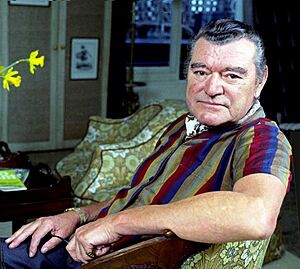Jack Hawkins facts for kids
Quick facts for kids
Jack Hawkins
|
|
|---|---|

Hawkins in 1973, photographed by Allan Warren
|
|
| Born |
John Edward Hawkins
14 September 1910 Wood Green, Middlesex, England
|
| Died | 18 July 1973 (aged 62) Chelsea, London, England
|
| Alma mater | Italia Conti Academy of Theatre Arts |
| Occupation | Actor |
| Years active | 1923–1973 |
| Spouse(s) | |
| Children | 4 |
| Military career | |
| Allegiance | United Kingdom |
| Rank | |
| Unit | |
| Signature | |
 |
|
John Edward Hawkins, known as Jack Hawkins, was a famous English actor. He was born on September 14, 1910, and passed away on July 18, 1973. Jack Hawkins worked on stage and in movies from the 1930s to the 1970s. He was one of the most popular British film stars in the 1950s. Many people knew him for playing military characters in his films. He was also honored with the CBE award.
Contents
Becoming an Actor: Jack Hawkins' Early Life
Jack Hawkins was born in Wood Green, London. His father was a builder. Jack went to Trinity County Grammar School. When he was eight, he joined the school choir.
By age ten, Jack was part of a local opera group. He first performed on stage in an opera called Patience. His parents then sent him to the Italia Conti Academy, a famous acting school.
When he was thirteen, Jack made his first London stage appearance. He played the Elf King in Where the Rainbow Ends in December 1923. A young Noël Coward was also in that show. The next year, at 14, he played a page in Saint Joan. Five years later, he acted with Laurence Olivier in Beau Geste. By the time he was 18, he was performing on Broadway in Journey's End.
Acting in the 1930s
In the 1930s, Jack Hawkins mostly focused on stage acting. He worked with famous actors like Sybil Thorndike and John Gielgud. Some of his stage plays included Port Said (1931) and As You Like It (1933). He also acted with his wife, Jessica Tandy, in Iron Flowers (1933).
He started appearing in films during this time. These included both quick, low-budget movies and bigger productions. Some of his early films were Birds of Prey (1930) and The Lodger (1932). He also appeared in The Good Companions (1933) and Autumn Crocus (1934).
Jack also did radio plays. In 1932, he was in a radio version of Hamlet. He also appeared in Death at Broadcasting House (1934) and Lorna Doone (1934). Later in the 1930s, he was in films like The Frog (1937) and A Royal Divorce (1938). He continued to perform in many theatre productions as well.
Serving in World War II
During the Second World War, Jack Hawkins joined the British Army. He became a second lieutenant in the Royal Welch Fusiliers in 1941. Later, he transferred to the Expeditionary Force Institutes (ENSA). He served with ENSA in India and Southeast Asia, entertaining the troops. When he left the army in 1946, he was given the honorary rank of colonel.
While serving in the military, he still managed to make one film. This was The Next of Kin (1942) for Ealing Studios.
After the War: Building a Career
Jack Hawkins left the army in July 1946. Soon after, he returned to the stage. He appeared in The Apple Cart. The next year, he starred in Othello.
He signed a contract with film producer Sir Alexander Korda. This helped him get more film roles. His first film for Korda was Bonnie Prince Charlie (1948). He then had a good role in the highly praised film The Fallen Idol (1948). He also impressed audiences as a villain in State Secret (1950).
Hollywood studios also noticed him. He supported Tyrone Power in the big movie The Black Rose (1950). He also played the Prince of Wales in The Elusive Pimpernel (1950).
Jack played the main role in The Adventurers (1951). He then had a strong role in No Highway in the Sky (1951) with James Stewart. This was followed by a British thriller, Home at Seven (1952). In 1951, he also went back to Broadway to play Mercutio in Romeo and Juliet.
Becoming a Star
Jack Hawkins became a big star with three successful films released around 1952. In these movies, he often played strong, fair leaders. He was an RAF officer in Angels One Five (1951). He played a rubber planter fighting communists in The Planter's Wife (1952). In Mandy (1952), he was the headmaster of a school for deaf children. All these films were very popular in Britain in 1952. He was voted the fourth most popular British star.
His fame grew even more with The Cruel Sea (1953). He played a naval officer during World War II. This film was the most successful movie of the year. Jack Hawkins was voted the most popular star in Britain, regardless of where they were from. People saw him as representing the "stiff upper lip" British spirit.
He starred in another military film, Malta Story (1953). Here, he was an RAF officer during the Siege of Malta. This film was also a big hit. He then appeared in The Intruder (1953) and Front Page Story (1954).
In The Seekers (1954), he played a rare romantic role. He then starred in The Prisoner (1955). In this film, he played a clever interrogator. Even though these films were not huge hits, he was still very popular. In 1954, he was the fifth biggest star in Britain and the most popular British one. He said he wanted to play different kinds of characters, not just the "decent fellows."
Becoming an International Star
Jack Hawkins got his wish when he received an offer from Hollywood. He played a pharaoh in Land of the Pharaohs (1955).
He then made a comedy film back home, Touch and Go (1955). He was also a police officer in The Long Arm (1956). He played a test pilot in The Man in the Sky (1957).
His career got a huge boost with The Bridge on the River Kwai (1957). He played Major Warden alongside William Holden and Alec Guinness. This movie was a massive success and received many awards.
In 1958, he was appointed a Commander of the Order of the British Empire (CBE).
Jack Hawkins played the main role in Gideon's Day (1958), as a police officer. He then had a good role as a double agent in The Two-Headed Spy (1958). He also played a Roman admiral in the huge Hollywood film Ben-Hur (1959). This movie was even more successful than Bridge on the River Kwai.
He also appeared on TV in The Four Just Men (1959). One of his favorite films was The League of Gentlemen (1960). This was his last main role in a film.
Later Career and Health Challenges
In the late 1950s, Jack Hawkins started having voice problems. He had treatment in 1959 for a condition in his throat, which was likely cancer. He worried about losing his voice. This made him accept almost any acting job he could get. He felt he needed to earn as much as possible while he still could.
He played General Cornwallis in La Fayette (1961). He also supported Shirley MacLaine in Two Loves (1961) and Rosalind Russell in Five Finger Exercise (1962).
He was in another big hit, Lawrence of Arabia (1962), playing General Allenby. In Zulu (1964), he had a good supporting role as a priest. His days as a leading star were starting to end.
He continued to take supporting roles in films like The Third Secret (1964) and Lord Jim (1965). He also appeared on American TV.
Illness and Continuing to Act
In December 1965, Jack Hawkins was diagnosed with throat cancer. In January 1966, his entire voice box (larynx) was removed. After this, his voice was often dubbed by other actors, like Robert Rietti or Charles Gray. In private, he used a special machine called a mechanical larynx to help him speak.
Even after losing his voice, he continued his acting career. His dialogue was kept to a minimum. He appeared in Shalako (1968) and Great Catherine (1968). In Oh! What a Lovely War (1969), playing Emperor Franz Joseph I of Austria, he had no lines at all. He had an operation in 1968 to try and restore his voice, but it didn't work fully. He could talk, but only with a croaking sound.
He was grateful that producers still wanted to hire him. He was always honest with them about his voice. He continued to act in comedies like Monte Carlo or Bust (1969) and Twinky (1970). He also appeared in more serious films such as Waterloo (1970), Jane Eyre (1970), and Nicholas and Alexandra (1971).
In The Last Lion (1972), he had a rare leading role. His final films included Young Winston (1972) and Theatre of Blood (1973). Jack Hawkins also helped produce the film The Ruling Class (1972).
Jack Hawkins' Family Life
Jack Hawkins married actress Jessica Tandy in 1932. They had one daughter, Susan (born 1934). They divorced in 1940. In 1947, Jack married another actress, Doreen Lawrence. They stayed married until his death. Together, they had three children: Andrew (born 1950), Caroline (born 1955), and Nicholas.
His Passing
In June 1973, Jack Hawkins was admitted to a hospital in London. He had an operation that made him leave a film he was working on. He passed away on July 18, 1973, at the age of 62.
His very last appearance was in a TV mini-series called QB VII. His autobiography, a book about his life, was published after he died. He was cremated, and his ashes were placed at Golders Green Crematorium in London.
British Box Office Popularity
During the 1950s, Jack Hawkins was consistently one of the most popular British stars. Film exhibitors in Britain voted for him in an annual poll:
- 1952 – 4th most popular British star
- 1953 – Most popular international star (meaning all stars, not just British)
- 1954 – 5th most popular international star, and most popular British star
- 1955 – 6th most popular British star
- 1956 – 2nd most popular British star
- 1957 – 9th most popular British star
- 1958 – 9th most popular British star
Images for kids
See also
 In Spanish: Jack Hawkins para niños
In Spanish: Jack Hawkins para niños
 | Valerie Thomas |
 | Frederick McKinley Jones |
 | George Edward Alcorn Jr. |
 | Thomas Mensah |


